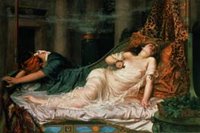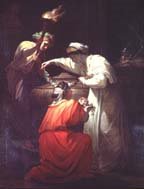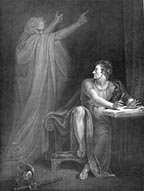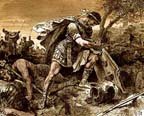Please listen to Tchaikovsky's SwanLake
 while going at it, to heighten your sense of sadness.
while going at it, to heighten your sense of sadness.


She shall be buried by her Antony.
No grave upon the earth shall clip in it
A pair so famous...
Antony and Cleopatra. This was true love, in a true love-hate relationship fashion. After losing the war to Octavius, Antony denounces Cleopatra. "This foul Egyptian hath betrayed me". Cleopatra stages her own death to get Antony back in her life which backfires on her. Antony, not being able to bear the pain, takes his own life. His asks Eros, his aide, to do the dirty deed for him (which drives a guilt-ridden Eros to commit suicide) and finally after several failed attempts wounds himself bad enough to die in Cleopatra's arms. Not one to back down, Cleopatra, refuses to surrender to Octavius, and intends to meet her love in her afterlife. She silently takes the bite of an asp in her hand. "Where's my serpent of old Nile? For so he calls me".
faces death at the Senate in the hands of the conspirators, who have taken oath to save Rome from a supposedly corrupt Monarchy. And such treachery is too much to bear for Caesar. "Et tu, Brute?" says Caesar, and "Then fall, Caesar..." says Shakespeare. "Friends, Romans, countrymen, lend me your ears...", says Marc Antony at Caesar's death and drives the Romans against Brutus. Caesar's ghost haunts Brutus to warn him of his impending defeat in the war with Antony and Octavian "thou shalt see me at Philippi". Brutus and Cassius commit suicide rather than falling into the hands of enemies.






No comments:
Post a Comment